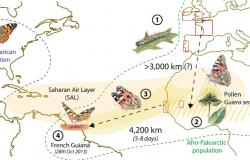As of this date at the end of June, 147 UN member states have recognized the Palestinian state. In recent weeks, after Spain, three other members of the European Union (Ireland, Norway and Slovenia) have recorded this recognition. Armenia has just made the same decision. To be precise, the Vatican, which is not a member of the World Organization, also opted in 2015 in this direction. It should be added that, since 2012, Palestine has been a non-UN observer. It does not have the right to vote in the General Assembly, but has the possibility of joining specialized agencies (WHO, UNICEF, UNESCO, etc.). She has also been a member of the International Criminal Court (ICC) since January 2, 2015 – which incidentally allowed her to refer this international jurisdiction on various occasions regarding Israel’s repression and abuses in the occupied territories. .
That said, what are the issues and meanings of the recognition of the State of Palestine in public international law? To begin with, it is worth recalling that in international law, the existence of a State is established independently of its recognition by others. The constituent elements of the State refer to a territory, a population and a sovereign government, therefore legally independent of any other higher authority. What about Palestine? These elements are indeed present and united. A territory was demarcated in the partition plan, with the legal basis of Resolution 181 of the United Nations General Assembly dated November 29, 1947. This recommended the partition of Palestine between an Arab state and an Israeli state. , the city of Jerusalem being placed under an international trusteeship regime. A population is also located in this territory, even if millions of Palestinians have been forced into exile. Finally, a Palestinian authority was established with the declaration of independence by Yasser Arafat, then president of the PLO, during the meetings of the Palestinian National Council on November 15, 1988. This State of Palestine was then proclaimed on a territory and it exercises its administration from Ramallah, in the occupied West Bank. This government cannot, however, exercise the fullness of its sovereign rights. The reason is the Israeli occupation, continued, recognized and even condemned as contrary to the rights of the Palestinian people. Does this lack of effectiveness prevent the Palestinian state from existing? Not at all! For example, we will give the situation of the State of Kuwait: did it cease to exist even though its government could not exercise its power there during the Iraqi occupation (August 1990-April 1911)?
The recognition of the Palestinian State by 147 UN member states reflects the consequences they have drawn from the resolutions or decisions adopted within this organization (General Assembly, Security Council, International Court of Justice, etc.). It issued an advisory opinion on July 9, 2004 on the “legal consequences of the construction of a wall in the occupied Palestinian territory”. They all have this common feature: they refer to a solution based on the existence of two States with rights that must be mutually guaranteed. Recognizing Palestine and Israel therefore reaffirms that negotiations between the two entities cannot relate to the statehood of one or the other. If we cannot deny Israel’s right to exist as a state, it is also inadmissible to deny the reality of a Palestinian state as a consequence of the right to self-determination. This is why we can only be surprised to see certain States affirm that the recognition of Palestine should wait or that it should be deserved and negotiated. It remains to initiate negotiations, preferably under the auspices of the United Nations, between the two peoples so that they can exercise their rights to self-determination.
This means that we cannot claim that recognizing Palestine would amount to consecrating and legitimizing Hamas. This assertion is neither admissible nor arguable: far from it. This is because, in fact, only the Palestinian Authority – radically opposed to Hamas – is considered the official government of Palestine. It is the Palestinian Authority which exercises Palestine’s rights within the United Nations and certain of its specialized institutions. It is also this same Authority which is represented by diplomats abroad and which concludes treaties with other States.
The recognition of a State is completely independent of the legitimacy of its representatives. Thus, recognizing the State of Israel does not mean supporting its current government, or that we will support its future governments, any more than we are opposing the prosecution of certain of its leaders before the Court. international criminal law. Likewise, recognizing Palestine is simply acknowledging the existence of two States, whatever the qualities and defects of their authorities and their nationals. Recognition is only a modality: it must lead the two parties to finally agree on the conditions of their coexistence.






